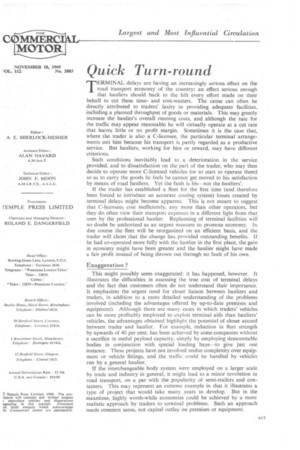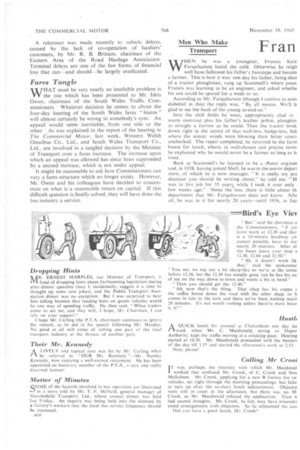Quick Turn-round
Page 49

Page 50

If you've noticed an error in this article please click here to report it so we can fix it.
TERMINAL delays are having an increasingly serious effect on the road transport economy of the country; an effect serious enough that hauliers should back to the hilt every effort made OD their behalf to cut these timeand cost-wasters. The cause can often be directly attributed to traders' laxity in providing adequate facilities, including a planned throughput of goods or materials. This may greatly increase the haulier's overall running costs, and although the rate for the traffic may appear reasonable he will virtually operate at a cut rate that leaves little or no profit margin. Sometimes it is the case that, where the trader is also a C-licensee, the particular terminal arrangements suit him because his transport is partly regarded as a productive service. But hauliers, working for hire or reward, may have different criterions.
Such conditions inevitably lead to a deterioration in the service provided, and to dissatisfaction on the part of the trader, who may then decide to operate more C-licensed vehicles (or to start to operate them) so as to carry the goods be feels he cannot get moved to his satisfaction by means of road hauliers. Yet the fault is his—not the hauliers'.
If the trader has established a fleet for the first time (and therefore been forced to introduce an accurate costing system) losses created by terminal delays might become apparent. This is not meant to suggest that C-licensees cost inefficiently, any more than other operators, but they do often view their transport expenses in a different light from that seen by the professional haulier. Replanning of terminal facilities will no doubt be authorized as an urgent measure to promote economy, in due course the fleet will be reorganized on an efficient basis, and the trader will claim that the change has provided outstanding benefits. If he had co-operated more fully with the haulier in the first place, the gain in economy might. have been greater and the haulier might have made a fair profit instead of being thrown out through no fault of his own.
Exaggeration ?
This might possibly seem exaggerated: it has happened, however. It illustrates the difficulties in assessing the true cost of terminal delays and the fact that customers often do not understand their importance. It emphasizes the urgent need for closet liaison between hauliers and traders, in addition to a more detailed understanding of the problems involved (including the advantages offered by up-to-date premises and equipment). Although there are many cases in which traders' vehicles can be more profitably employed to exploit terminal aids than hauliers' vehicles, the advantages obtained highlight the potential of closer accord between trader and haulier. For example, reduction in fleet strength by upwards of 40 per cent. has been achieved by some companies without a sacrifice in useful payload capacity, simply by employing demountable bodies in conjunction with special loading bays—to give just one instance. These projects have not involved undue complexity over equipment or vehicle fittings, and the traffic could be handled by vehicles run by a general haulier.
If the interchangeable body system were employed on a larger scale by trade and industry in general, it might lead to a minor revolution in road transport, on a par with the popularity of semi-trailers and containers. This may represent an extreme example in that it illustrates a type of project that would take many years to develop. But in the meantime, highly worth-while economies could be achieved by a more realistic approach by traders to terminal problems. Such an approach needs common sense, not capital outlay on premises or equipment. A reference was made recently to vehicle delays, caused by the lack of co-operation of hauliers' customers, by Mr. R. B. Brittain, chairman of the Eastern Area of the Road Haulage Association, Terminal delays are one of the few forms of financial loss that can—and should—be largely eradicated.
Fares Tangle
WHAT must be very nearly an insoluble problem is the one which has been presented to Mr. Idris Owen, chairman of the South Wales Traffic Commissioners Whatever decision he comes to about the four-day hearing of the South Wales fares " hiatus " will almost certainly be wrong in somebody's eyes. An appeal would seem inevitable, from one side or the other. As was explained in the report of the hearing in The Commercial Motor. last week, Western Welsh Omnibus Co., Ltd., and South Wales Transport Co., Ltd., are involved in a tangled decision by the Minister of Transport over a fares increase. The increase upon which an appeal was allowed has since been superseded by a second increase, which is not under appeal. It might be reasonable to ask-how Commissioners can vary a fares structure which no longer exists. However, Mr. Owen and his colleagues have decided to concentrate on what is a reasonable return on capital. If this difficult question is finally solved, they will have done the bus industry a service.




































































































































